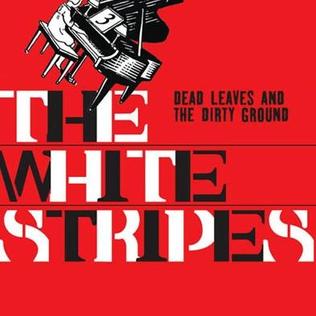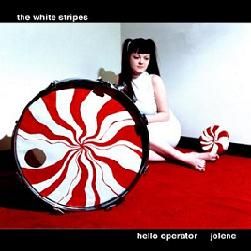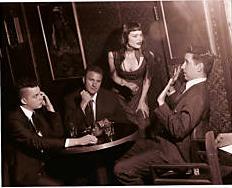
The White Stripes were an American rock duo formed in Detroit, Michigan, in 1997. The group consisted of Jack White and Meg White. They were a leading group of 2000s indie rock and the decade's garage rock revival.

Elephant is the fourth studio album by the American rock duo The White Stripes, released on April 1, 2003, by V2, XL, and Third Man records. The album was produced by the band's guitarist and lead vocalist Jack White, and continues their "back-to-basics" approach as seen in their previous album, White Blood Cells (2001). It was mostly recorded at Maida Vale and Toe Rag Studios across two weeks in April 2002, and was produced without the use of computers, instead utilizing a duct-taped 8 track tape machine and various gear no more recent than 1963.

De Stijl is the second studio album by the American rock duo the White Stripes, released on June 20, 2000, by the Sympathy for the Record Industry. Produced by the band's guitarist and lead vocalist Jack White, the album was recorded on an 8-track analog tape in his living room following the covert divorce of members Jack and Meg White, who nevertheless continued working together. The album takes its name from the art movement of the same name, and features their early blues-inspired sound.

John Anthony White is an American musician, singer, songwriter, and producer who achieved international fame as the guitarist and lead singer of the rock duo the White Stripes. As the White Stripes disbanded, he sought success with his solo career, subsequent collaborations, and business ventures.

Megan Martha White is an American musician who achieved international fame as the drummer of the rock duo the White Stripes. Though she typically performed backing vocals for the band, she occasionally sang lead on their albums, including "In the Cold, Cold Night" and "Passive Manipulation".

"My Doorbell" is a song by American alternative rock band the White Stripes, released as the second single from their album, Get Behind Me Satan (2005), on July 11, 2005. The song garnered the White Stripes a 2006 Grammy nomination for Best Pop Performance by a Duo or Group with Vocals. The video for this single was directed by the Malloys, filmed in black-and-white, and features Jack and Meg performing in front of a crowd of children; it was filmed at The Magic Castle in Hollywood, California.

Third Man Records is an eclectic, vinyl-focused independent record label founded and owned by Jack White, Ben Blackwell, and Ben Swank. The company operates out of three locations—Nashville, Detroit, and Soho in London—with multiple entities expanding upon the offerings of a traditional record label, including multiple live music venues, vinyl pressing plant, film studio and dark room, guitar pedal and gear company, mastering studio, vinyl subscription service, and a publishing arm.

Under Blackpool Lights is the first official DVD released by The White Stripes. The DVD consists of 26 tracks recorded at The Empress Ballroom at the Winter Gardens in the English seaside resort of Blackpool on January 27 and 28, 2004, and directed by Dick Carruthers using super 8 film. Among these tracks, as with most White Stripes live performances, are several cover songs – such as "Take a Whiff on Me", "Outlaw Blues", "Jack the Ripper", "Jolene", "Death Letter", "Goin' Back to Memphis", and "De Ballit of de Boll Weevil".

"Fell in Love with a Girl" is a song by the American rock duo the White Stripes, written by the band and produced by Jack White for the band's third studio album, White Blood Cells (2001). Released as the album's second single in February 2002, it peaked at number 21 on both the US Bubbling Under Hot 100 Singles chart and the UK Singles Chart. It was also the band's first single to reach the U.S. Alternative Songs chart, peaking at number 12.

"Seven Nation Army" is a song by American rock duo the White Stripes. It is the opening track on their fourth studio album, Elephant (2003). V2 Records released the song to American alternative radio on February 17, 2003, as the lead single from the album. Worldwide, the single was issued through XL Recordings. Written and produced by Jack White, the song consists of distorted vocals, a simple drumbeat, and a bass line created by playing a guitar through a pitch shift effect.

"The Hardest Button to Button" is a song by American alternative rock band the White Stripes, released on August 11, 2003 through V2, XL, and Third Man records. It was written by Jack White and composed by the band for their fourth album, Elephant. According to Jack, the song is about a child trying to find his place in a dysfunctional family when a new baby comes. The cover of the single is an allusion to the graphics of Saul Bass, seen in the movie posters and title sequences of films such as Anatomy of a Murder and The Man with the Golden Arm. The cover also alludes to White's then-broken index finger and his obsession with the number three.

"Dead Leaves and the Dirty Ground" is a song by American garage rock band the White Stripes, featured on their 2001 third studio album White Blood Cells. Written by the band and produced by vocalist and guitarist Jack White, "Dead Leaves" was released as the third single from the album in July 2002, charting at number 19 on the US Billboard Modern Rock Tracks chart and number 25 on the UK Singles Chart.

"We're Going to Be Friends" is a song by American alternative rock band White Stripes from their album White Blood Cells. It was released in 2002 and tells the story of meeting a new friend at the beginning of a school year.

"Hello Operator" is the only single released from De Stijl, the second album by the Detroit, Michigan, garage rock band the White Stripes. It was released in May 2000, backed by the White Stripes' off-kilter cover of Dolly Parton's "Jolene". Live recordings of both songs are available on Under Blackpool Lights.

The American duo the White Stripes has released six studio albums, two live albums, four video albums, one compilation album, one extended play, 28 singles, and 20 music videos.
"In the Cold, Cold Night" is a song by American rock duo the White Stripes from their fourth studio album, Elephant (2003). The fifth track on the album, it was written and produced by Jack White specifically for Meg White to sing, marking her first time as the band's lead vocalist. Musically, "In the Cold, Cold Night" features a minimalist soundscape and ambiguous lyrics about a woman pleading for her lover's return. The song has received positive reviews from music critics, who consider it a signature work of the band and one of their best songs.

Two-Star Tabernacle was a short-lived punk rock band from Detroit. Two-Star Tabernacle consisted of Jack White, Dan John Miller, Tracee Mae Miller and Damian Lang.

Gary Lee Clark Jr. is an American guitarist and singer who fuses blues, rock and soul music with elements of hip hop. In 2011, Clark signed with Warner Bros Records and released The Bright Lights EP. It was followed by the albums Blak and Blu (2012) and The Story of Sonny Boy Slim (2015). Throughout his career, Clark has been a prolific live performer, documented by Gary Clark Jr. Live (2014) and Gary Clark Jr Live/North America (2017).

White Blood Cells is the third studio album by American rock duo the White Stripes, independently released by the Sympathy for the Record Industry on July 3, 2001. Recording took place in Memphis, Tennessee at Easley-McCain Recording over three days, and was produced by guitarist and lead vocalist Jack White. Production was rushed in order to capture a "real tense feeling" and the band's energy, and was their first album to be mastered in a studio.

















